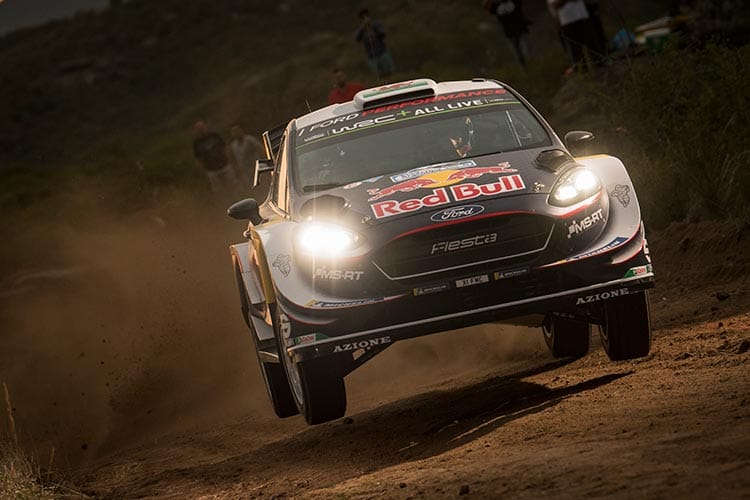Another classic rally steeped in history, the Vodafone Rally de Portugal is the FIA World Rally Championship’s first visit to European gravel in 2018 and marks the point in the season when things traditionally begin to hot up. Early season cobwebs have been well and truly banished, the new crop of cars are up to speed and reaching the apex of their development cycles, and the title charge (as we’ll soon see) already appears to have narrowed to a three horse race. Let’s have a look at what makes the Portuguese round such a beguiling spectacle for drivers and spectators alike.
2018 Vodafone Rally de Portugal – The Rally
Rally Portugal has a long history of World Rally Championship level competition having been on the calendar since the inaugural 1973 season, but of course it hasn’t always been a positive association. Shocking, near criminally negligent levels of crowd control in the mid ’80s meant Portugal hosted Group B’s darkest hour, and it wasn’t until the middle of the following decade that the event really got a handle on the problem. An enforced hiatus in 2003 (effectively an FIA sanctioned ‘sin binning’) galvanised Rally Portugal’s top brass still further, and since 2007 the rally has become a firm fan favourite, something no doubt helped by the decision to relocate the event back to its classic northern heartland in time for the 2015 running.
2018 Vodafone Rally de Portugal – The Route

Credit: Jaanus Ree / Red Bull Content Pool
It’s a case of deja vu as far as the route is concerned, with the vast majority of competitive stage mileage having been carried over from last year in wholesale fashion. That’s no bad thing, as 2017’s route was generally regarded as being a good mix of classic stage action in the countryside, and the urban, casual fan-attracting tests demanded by all modern WRC events. Thursday’s action is limited in scope, the drivers kicking things off with a ceremonial start in Guimarães Castle before tackling the Lousada rallycross circuit.
Friday sees the crews tackling 152.02km of competitive stage mileage, with Vian do Castelo (26.7km) kicking things off, swiftly followed by Caminha (18.1km) and Ponte de Lima (27.5km). The trio of tests are repeated in the afternoon leg, before Friday is rounded off with a pair of blasts through the 1.95km Porto street stage.
Saturday is the longest leg of the rally at 154.6km and features three classic stages; Vieira do Minho (17.5km), Cabeceiras de Basto (22.2km) and Amarante (the longest of the event at 37.6km), all repeated in the afternoon.
Sunday rounds off proceedings in typical Rally Portugal fashion, the 8.6km of Montrim giving way to the 11.1km test of Fafe (complete with oh-so-iconic jump metres from its conclusion) and Montrim (8.6km). The re-run of Fafe is the Power Stage and the total competitive mileage for the leg is 51.5km.
2018 Vodafone Rally de Portugal – Car Setup
Portions of Rally Portugal aren’t so much gravel as a mix of sand and dust, so grip has long been a deciding factor, particularly for those tasked with running first on the road. In line with other technical gravel tests like Argentina and Sardinia the stages tend to degrade rapidly as the leg wears on, the top level of dust giving way to unforgiving bedrock and suspension-wrecking ruts. The need to devise a suitable spring/damper setup, combined with the usual hard or soft tyre call, serves to make Portugal a vexing round for teams and their engineers.
Toyota Gazoo Racing World Rally Team

Credit: Jaanus Ree / Red Bull Content Pool
You could never say that Ott Tanak’s victory last time out in Argentina was unexpected (he’d been threatening to do just that since his very first Toyota outing back in January), but the comprehensive manner in which he went about it certainly was. Three weeks on and with a broadly similar rally in the offing, Tanak and Toyota will doubtless be feeling pretty happy, not least as the already potent Yaris is set to receive a torque-boosting engine upgrade in time for Finland. Tanak will begin the rally running third on the road, so not low down enough to avoid road sweeping duties altogether, but better than his two closest contenders for the title.
Two no-scores in the last two rounds have all but wrecked Jari-Matti Latvala’s title ambitions and have left him floundering in 8th, just below team mate Esapekka Lappi in the drivers’ standings. Latvala sorely needs a run of good form, for his himself and his mental state as much as anything else, and will likely look to hit re-set in Portugal. Lappi will also hope for a more competitive showing, ideally without the litany of punctures which stalked him throughout Argentina.
M-Sport Ford World Rally Team

Credit: Jaanus Ree / Red Bull Content Pool
M-Sport’s rather subdued showing last time out prompted a degree of soul searching back in Cumbria, not to mention in-depth analysis of Sébastien Ogier and Elfyn Evans’ respective performances. The Fiesta’s poor performance in low grip conditions has prompted the team to make minor differential and suspension tweaks in order to extract greater grip and life from their Michelin tyres, and Ogier and Evans (and the returning Suninen) will have everything crossed for a more competitive showing this weekend.
Hyundai Shell Mobis World Rally Team

Credit: Jaanus Ree / Red Bull Content Pool
What Hyundai’s trip across the Atlantic lacked in glitz and glory it more than made up for in cold, hard manufacturers’ points, the Korean outfit returning to the WRC’s European heartland with a useful 15 point lead over M-Sport. Consistency has been the key of course, backed up by a trio of drivers able to bank points in all events, but it has also served to mask some of the i20 WRC’s flaws, namely a lack of outright pace on some rallies.
Thierry Neuville came home in second in Argentina and will no doubt seek to go one better in Portugal, not least as (in championship terms at least) the presence of Ott Tanak in third looms ever larger in his rear-view mirror. It has been several months since the Belgian’s last victory in the snows of Sweden, and while consistent podiums have kept him in touch with Ogier so far, he’ll be acutely aware of the need to re-establish his own title aspirations.
It feels harsh to once again be describing Andreas Mikkelsen’s season to date as ‘anonymous’ (especially as he came home in fifth in Argentina), but the cold, hard truth of the matter is that the Norwegian has struggled to make an impact for Hyundai to date. He’ll need to begin doing just that in Portugal, not least as Hayden Paddon (back in the fold for the first time in months) will be out to remind Michel Nandan and co what they’ve been missing out on.
Citroën Sport World Rally Team

Credit: Jaanus Ree / Red Bull Content Pool
Citroën is in the unusual position of having two previous winners of Rally Portugal in its ranks, Kris Meeke having triumphed here two years ago, ‘super sub’ Mads Ostberg claiming outright victory back in 2012. The team will of course hope for a repeat performance in 2018 but might struggle, and this despite the C3 WRC’s improving pace and largely tamed handling. Make no mistake, the Citroën team of today is far better placed than it was at this point last year (despite the lack of wins), but it remains shy of the outright pace and consistency exhibited by its rivals.
Poorly timed punctures riddled Citroën’s Argentine performance, and Meeke bore the brunt, dropping off the podium and to the nether regions of the top ten by the end of the rally. He’ll be hoping for improved fortune on a rally that has proved to be happy hunting ground in years gone by, and will no doubt be aided by his advantageous starting position.
Craig Breen is another driver in need of a solid performance after a violent (and premature) exit from Rally Argentina. The Irishman really needs to re-discover the consistency that saw him christened ‘Mr 5th Place’ throughout 2017, and Portugal looks like as good a place to start as any.
Citroën’s Portuguese assault will aided by the aforementioned Ostberg, the Swede back in a 2018 spec WRC car for the first time since his home round back in February. There’s every chance that Ostberg might spring a surprise or two given his road order and Rally Portugal CV, but his relative lack of seat time means that he could well struggle to match the WRC’s regulars.
WRC2 – Tidemand looking to maximise opportunities

Credit: Jaanus Ree / Red Bull Content Pool
The ‘usual suspects’ remain the favourites for class honors despite a bumper entry of WRC2 entrants, a result of the championship’s return to mainland Europe. Skoda’s Pontus Tidemand holds an 18 point advantage over team mate Jan Kopecky going into Rally Portugal, and will look to add more in the Czech driver’s absence.
Skoda’s lead driver heads a field largely dominated by blue oval metal, with Gus Greensmith, Pedro Heller and Kevin Abbring all lining up in Fiesta R5s. We can also look forward to another thrilling battle between the Makinen-run Fiestas of Takamoto Katsuta and Hiroki Arai, both rapidly improving, both one eye on the works Toyota WRC drive. Whether Katsuta will be able to replicate his stunning class win in Sweden remains to be seen, but he’ll certainly be in the hunt.
R5 rallying continues to attract impressive OEM support, on the WRC2 stage at least, and Portugal will also see entries for Hyundai (Jari Huttunen and Louis-Pierre Loubet) and Citroën (Stéphane Lefebvre).
WRC Entry list
1 – Sébastien Ogier – Ford Fiesta WRC
2 – Elfyn Evans – Ford Fiesta WRC
3 – Teemu Suninen – Ford Fiesta WRC
4 – Andreas Mikkelsen – Hyundai i20 WRC
5 – Thierry Neuville – Hyundai i20 WRC
6 – Hayden Paddon – Hyundai i20 WRC
7 – Jari-Matti Latvala – Toyota Yaris WRC
8 – Ott Tanak – Toyota Yaris WRC
9 – Esapekka Lappi – Toyota Yaris WRC
10 – Kris Meeke – Citroën C3 WRC
11 – Craig Breen – Citroën C3 WRC
12 – Mads Ostberg – Citroën C3 WRC
13 – Yazeed Al-Rajhi – Ford Fiesta RS WRC
WRC2 Entry List
1 – Pontus Tidemand – Skoda Fabia R5
2 – Gus Greensmith – Ford Fiesta R5
3 – Pedro Heller – Ford Fiesta R5
4 – Takamoto Katsuta – Ford Fiesta R5
5 – Jari Huttunen – Hyundai i20 R5
6 – Fabio Andolfi – Skoda Fabia R5
7 – Łukasz Pieniążek – Skoda Fabia R5
8 – Nil Solan – Ford Fiesta R5
9 – Louis-Pierre Loubet – Hyundai i20 R5
10 – Hiroki Arai – Ford Fiesta R5
11 – Kevin Abbring – Ford Fiesta R5
12 – Stéphane Lefebvre – Citroën C3 R5



